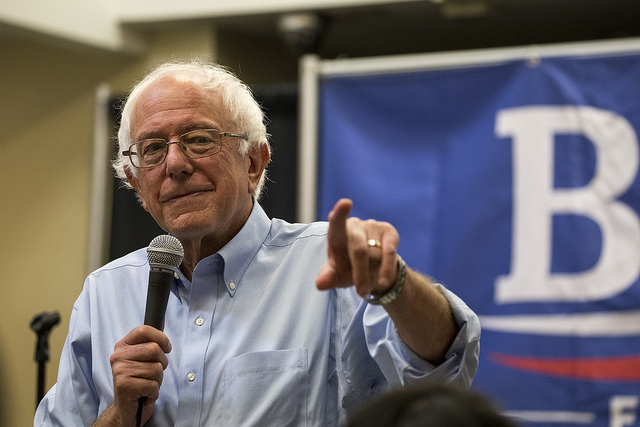With young people now ready as ever to align with an ideology once stigmatised, and the GOP now having nowhere to go in the face of rapidly growing anti-establishment sentiment, what’s the next step for the political establishment? Martin Andersen explains.
Bernie Sanders’ rise and rise looks set to continue, but no-one could have expected a socialist to come this far – after all, with the United States’ history of McCarthyism and Red Scares, he was always going to be painted as a radical.
Yet, a February poll revealed that American youth view socialism more favourably than capitalism. So why are young Americans flocking to embrace an ideology they’ve been taught to hate?
As the Presidential Race edges closer to an inevitable tipping point, perhaps there’s no better time to reflect on what has transpired in these unforgettable few months.

For the first time in recent history, on the Democratic side at least, economic policy appears to be the headline issue. Hillary Clinton – who staunchly aligns with Obama’s ideology of social progressivity on select issues, coupled with firm economic conservatism and emphasis on both authoritarianism and foreign interventionism – has founded her campaign on an “if it ain’t broke” philosophy that is just as neoconservative as the incumbent president’s.
And who could blame her – at first look, it would seem that the policy is much in line with traditional American values: interventionist foreign policy and non-interventionist economic policy.
However, Sanders’ rejection of neoconservatism is a refreshing change, especially after over 15 years of post-9/11 authoritarianism.
His continued success indicates a widespread realisation among the populace that establishment politics have failed them economically, have suppressed their individual freedoms, and have caused chaos on the international stage.

Following a 2012 election in which all candidates were more or less neoconservatives, we had four years of pent-up frustration from both sides – the GOP, who laughably labelled Obama a socialist; and the Dems, who were surprised to see a man they once thought progressive, now refusing to challenge Wall St, pursuing whistle-blowers and expanding government surveillance.
In November, that all looks set to change.
For the GOP, although all of the candidates seem to align philosophically, the establishment has a logistical issue: with moderates like John Kasich representing a broken status quo, Ted Cruz being patently unelectable in a general election, and Donald Trump threatening to end the party as we know it, all roads lead to failure.

There is always the option of Paul Ryan snatching the nomination at a contested convention, but such a power-play is unlikely to sit well with voters, in addition to the fact that he’s predicted to lose to both Clinton and Sanders.
The question remains: where do they go from here?
Because although the Democrats can counter anti-establishment sentiment by shifting further to the left – as Clinton has done with the Trans-Pacific Partnership – the Republicans are left with nowhere to go. By shifting further to the right, they’re reducing their electability significantly, because it’s hard to argue that measures like deregulating Wall St even further will remedy issues of inequality.
On the other hand, Sanders’ surge shows that Americans are finally ready to take a stand against a floundering status quo, and the young are leading the way.
With many having watched their parents’ middle-class status disintegrate over the last decade or two, they’re as determined as ever to put a stop to the prolific inequality which is preventing them from attending university, owning homes, and accessing healthcare services when they need them.
So, although it has become something of a cliché, Sanders’ involvement in the presidential race will be no less of a revolution even if he doesn’t win. And although we’re quick to dismiss “The Donald” as a crude manifestation of pent-up fear and anger, he’s a sign of a bigger problem.
Looking back, we’re likely to see the 2016 election as a turning point against neoconservatism and establishmentarianism; moving forward, let’s hope that a rejection of the status quo becomes the new norm.
Donate To New Matilda
New Matilda is a small, independent media outlet. We survive through reader contributions, and never losing a lawsuit. If you got something from this article, giving something back helps us to continue speaking truth to power. Every little bit counts.





